
SPECTRUM MUDDLE Delhi High Court must fast-track the 2G scam appeals on daily basis to bring justice
by J Gopikrishnan / 06 June 2018Demanding for fast tracking in 2G cases appeal, on the very first day of hearing of CBI and ED’s appeal on May 25 in Delhi High Court, the Special Public Prosecutor Tushar Mehta said the 2G Scam is a monumental scam and shame on the Nation. He was objecting to the usual delaying tactics played by some accused claiming that they have not yet received notice and some demanding for more time to reply for the notice issued on March. Now the case is heard by Justice SP Garg and he is going to retire in June and a new Judge has to hear the appeal arguments from August first week.
As rightly demanded by Tushar Mehta, the appeal of CBI and ED against the very bad judgment of trial court Judge OP Saini must be heard on daily basis. The Judiciary must take call to the undo the bad trail court judgment, which is totally against the findings of Supreme Court and Delhi High Court. It is another question, how trial Judge OP Saini arrived in such a bizarre conclusions and totally ignored the concrete proofs of money transfers between former Telecom Minister Raja’s firm and his party controlled TV channel from co-accused telecom operators.
The very idea of the accused persons now acquitted is to drag the appeal process to four – five years. Such is the level of money spin in this case which I can vouch as a reporter who started tracking this humongous scam from late 2008. The more than 1500-page judgment of the trail court is totally bad in law with many errors and full of false narrative. I have read this bad Judgment of Judge OP Saini many times and it is totally against the Supreme Court Judgment cancelling all the 122 licences. It is also against the Delhi High Court’s Judgment which was ratified by Division Bench and Supreme Court on the allotment of licences on dubious First-Come-First-Serve basis by Minister A.Raja.
CBI and ED in its appeal petition described Judge OP Saini’s judgment as totally erroneous. The Judge has ignored the spirit of Prevention of Corruption Act and even went up to give clean chit to Minister A.Raja by putting blame of officers. The trail Judge has even blamed officers whom he has not yet examined. Without examining a person, how Judge blamed then PMO’s top officers TKA Nair and Pulok Chatterjee. Don’t know why these two officers keeping criminal silence when they were blamed by trial judge without examining them. They should have approached Delhi High Court at least to rectify this. Are they shouldering the sin committed by their boss and real boss?
Above all, the trial court Judgment is totally against the landmark judgments Shamsher Singh Judgment and Bhajan Lal Judgments on corruption cases. The Shamesher Singh Judgment clearly says Minister is the final responsible person and not the officers. Here Judge Saini erratically put blame on officers and doubtfully gives clean chit to Raja, who is indicted by Supreme Court on many words while cancelling the 122 licences in February 2012.
Judge OP Saini has totally ignored the crucial witnesses and terms them as they have political differences with Raja. This is totally against the spirit of the Bhajan Lal judgment which says the political differences is not at all the matter and only fact of the statements only to be considered. If a person is a friend will he depose against? The cases crop up due to difference of opinion and this is a basic fact. Judiciary has only to look into the facts raised by the witness and not the other matters. I have submitted a detailed note on the errors and faults in the trial court Judgment to CBI, ED and Special Public Prosecutor as dutiful citizen of this country.
Now Enforcement Directorate (ED) is seeking data from Stock Exchange Board of India (SEBI) doubting on the prior knowledge of some accused about the controversial Judgment of Judge OP Saini. According to ED, few weeks before the Judgment, there was a huge volume of buying in the almost dead shares of certain companies owned by accused persons. It is high time to finish the probe on this regard and the agencies as well as Judiciary must fast track this probe on the fixing of cases.
The Government, CBI, ED and Special Public Prosecutor must reiterate their demands for the fast track hearing on the appeal against controversial 2G Judgment in Delhi High Court. The Delhi High Court must allot specific time for daily hearing in 2G cases and Chief Justice must take a call to bring justice in the trial court’s judgment which itself looks like erroneous.
[J Gopikrishnan is Special Correspondent with ‘The Pioneer’ daily]

Assam: Thousands Join Mass Hunger Strike to Protest against Citizenship Bill
by Anup Sharma / 30 May 2018The protest against the citizenship bill 2016 has gained push in Assam as thousands of people from different section of the society joined a full day hunger strike in Guwahati on Tuesday disapproving the bill.
The mass hunger strike organised by the All Assam students’ Union (Aasu) started at 6 am and continued till 5pm which witnessed participation from 28 organizations including different tribal students’ organizations, cultural organizations, senior citizens’ as well as intellectuals and different political parties including the Asom Gana Parishad (AGP) and the Congress. The AGP is a partner of the BJP led government in Assam.
The participants of the hunger strike unitedly sent a strong message to the Government that the controversial Bill will not be accepted at any cost.
“Assam is not a dumping ground of Bangladeshis. Ours is a small, state and we have taken enough burden of foreigners since before Independence. But we cannot afford to have any more Bangladeshis, which ha posed threat to the indigenous people of Assam,” said Aasu Adviser Dr. Samujjal Bhattacharyya.
Writer: Anup Sharma
Courtesy: The Pioneer
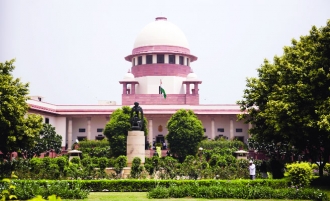
Parliament’s Power of Making Laws Can’t Be Usurped
by DN Goburdhun / 21 May 2018Legislature, Judiciary, and Executive, the creators of the Constitution, are the three major organs of the state. Powers among them are isolated. The decision taken by them and the laws made by them can’t be usurped by anyone.
Unlike England, India has a written Constitution. But still, in the UK, the legislature, the executive or the judiciary would never trespass. On the one hand, in India, the judiciary very often breaches this fundamental line. The Supreme Court transgresses into the Parliament’s turf and usurps power of the legislative to enact laws.
This encroachment by the judicial legislation is in sharp contrast to any democratic form of Government where ‘Separation of Powers’ reigns supreme.
This judicial overreach also runs contrary to the basic structure doctrine of the Indian Constitution. For, the founding Fathers of the Nation had earmarked in the Constitution that the legislature, executive and the judiciary would operate and be the masters in their own spheres.
Judiciary was meant to interpret laws made by the Parliament. It could declare a law — made by the legislature or even an Amendment to the Constitution — a nullity or perfectly valid.
But with the advent of Public Interest Litigation, the beliefs of the Founding Fathers of the Constitution became a mirage. Earlier, the judiciary was adjudicating on the English model, as enunciated in our Constitution where laws were only interpreted by the courts.
However, of late, the Supreme Court has been taking suo moto notice of issues where it feels laws in that particular field have not been made by the Parliament; and that its judgement would be the law. This per se is judicial overreach and such judicial activism shakes the very foundation of the doctrine of ‘Separation of Powers’ upon which the Constitution’s edifice stands.
In Aruna Shanbaug’s case (2011[4] SCC 354), former Supreme Court judge Markandey Katju’s opinion to the Bench, which is the law of the land on euthanasia, is a striking example of judicial activism.
Even in the UK and France, Bills on euthanasia could not be passed as there was stiff opposition. In Holland and Belgium, Parliaments have enacted laws but India is not ready as the then Attorney General informed the Bench.
Nonetheless, the Supreme Court, speaking through Justice Katju, took over the legislative function of the Parliament and the judge-made law on legalised killing came into effect.
Such a judgement overreaches into the legislative domain and ex facie has to be deprecated for entering into Parliament’s arena. Such judicial legislation is dehors of our Constitution.
The case mentioned above also shows that the apex court’s anxiousness to venture into taboo areas where it should rightly have shown judicial restraint. However, there have been several cases where this lakshman rekha has been breached, yet, the Supreme Court has reiterated explicitly many a time that it should not cross over.
The larger issue is: Why should the Supreme Court legislate or issue such legislative-like and unheard of directions that Parliament is directed to enact a particular law?
By doing so, it shocks democratic countries overseas who too are governed by the rule of law as usurpation is unheard of where the rule of law thrives. Democracy survives only when all the three organs remain in their lanes and do not swim across.
Very often, as English judgements say, emotional facts make bad law. Adjudication by courts must be strictly in accordance with the law and not in derogation of the established principles of the law.
The proposition of the Doctrine of Seperation of Powers was expounded by the same judge.
In Hiramony’s case (2008[1] SCC 630), Justice Katju had opined that the Supreme Court should not encroach on the legislative field. Further, the top Court again, speaking though Justice Katju, held in Shraddhanand case (2007[12] SCC 288) that it had no power to amend the Constitution by a judicial verdict and that it could not arrogate to itself the power of the Parliament under the Constitution and must maintain self-restraint.
Again, Justice Katju, speaking for the Supreme Court in the Aravali Golf Club case (2008[1]SCC 683), held that in several cases which have come up in the Supreme Court, the Bench has observed that the judges of High Courts were unjustifiably trying to perform executive/legislative functions. This was clearly unconstitutional. In the name of judicial activism, judges cannot cross their limits and try to take on the functions that belong to another organ of the state.
He reiterated that the three organs of the state should not impinge on one another, as otherwise the delicate balance of the Constitution would be upset. Judges must know their limits and not behave like emperors.
Interestingly, Justice Katju said in a judgement that judges could not create law and then enforce it. Judges cannot direct the legislature to make a particular law. All the above judgements too were delivered by Justice Katju but when the euthanasia case came before his Lordships four years later, he chose to gloss over it and the maxim of judicial restraint was ignored.
Such aberrations in our judiciary must not shake up the basic Doctrine of Separation of Powers in India. An effective vigil is a must to ensure that such personal thoughts do not become the law of the land.
(The writer is a practising Supreme Court lawyer)
Writer: DN Goburdhun
Courtesy:The Pioneer
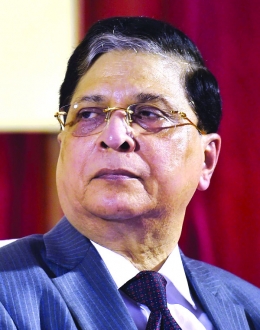
SIBAL WITHDRAWS PLEA AGAINST V-P CALL: Battle to continue
by Abraham Thomas / 09 May 2018After the impeachment notice against Chief Justice of India Dipak Mishra moved by 64 Opposition MPs failed to go through in the Rajya Sabha, there was an unexpected turn of events in Supreme Court on Tuesday. Two Congress Parliamentarians, who had challenged the decision of the RS Chairman, withdrew their petition after the court did not allow their counsel Kapil Sibal to see the order that listed their petition before a five-judge Constitution Bench.
A Bench of Justices Arjan K Sikri, Sharad Arvind Bobde, NV Ramana, Arun Mishra and Adarsh K Goel, who came prepared to hear the case on questions of law, were taken aback after Sibal sought to see the order constituting the Bench for hearing this case.
Sibal said his advocate on record was informed at 10.29 am (a minute to go before hearing of the case) by the Registry about the matter being listed before a five-judge Bench. Although the list was out late on Monday evening, Sibal wondered if the listing of the case was an administrative order and if so, who passed it. He dropped hints that he intended to challenge this decision if the CJI had passed the order constituting the Bench and listing the case before it.
However, the Bench said, “We should deal with the merits of the case. What purpose will be served by going into this aspect? It will lead us nowhere.”
Sibal assured the Bench that he was not acting with any malice or agenda but to keep the dignity of the institution high and process of law pure. In his view, the matter could travel to a Constitution Bench only by way of a judicial order. He questioned whether the power exercised by the CJI as master of roster was “untrammeled” that such orders could enjoy immunity from judicial scrutiny.
Anticipating a high voltage hearing, the courtroom was jam-packed with lawyers and mediapersons. The hearing was punctuated by objections raised on Sibal’s appearance in the case. Lawyer RP Luthra accused Sibal of pursuing an agenda against judiciary by first signing the motion of removal against the CJI as a Member of Parliament and later arguing it as a lawyer. Another lawyer Ashwini Upadhyay too raised protest by citing a Bar Council of India resolution condemning such a practice.
The Bench said, “If he (Sibal) appears in violation of your Resolution, you are free to take action against him. But you can’t restrain somebody from arguing unless there is an order that restrains him.”
At one point, Sibal submitted that if the Bench felt that he should not appear, he will withdraw. The Bench said, “We leave it to you,” following which Sibal proceeded with his arguments.
Attorney General KK Venugopal told the court that the petition was not fit to be heard as out of the seven political parties and 64 MPs who moved the removal motion, only 2 MPs had approached court raising doubts whether the other MPs had accepted the Chairman’s order. Sibal replied by saying such an argument has no foundation in law. He offered to bring 60 petitions to court, if this argument was to be accepted.
The Bench finally asked Sibal if he was willing to continue arguments on merits. But Sibal being adamant to be supplied the administrative order first, chose to withdraw the petition and the Bench ordered accordingly.
By Abraham Thomas: Courtesy – The Pioneer
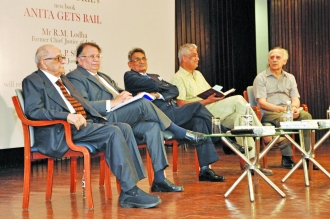
Justice AP Shah: India’s Judiciary becomes Cold-Spirited and Soulless
by Team Viva / 04 May 2018At the launch of Arun Shourie’s new book – ‘Anita gets Bail’, AP Shah, former Chief Justice of the Delhi High Court, RM Lodha, former Chief Justice of India, and Fali Nariman, Senior Advocate argued the current judicial landscape.
The wheels of justice often grind slow. And that is the reason, Arun Shourie — a journalist, economist, author and former cabinet minister—has decided to take up the cudgels on behalf of the ordinary citizen by taking up the case of his wife. His new book, Anita gets Bail – What are our courts doing? What should we do about them? revolves around a false case against his wife Anita Shourie. The book was released in the presence of RM Lodha, former Chief Justice of India; AP Shah, former Chief Justice of the Delhi High Court; Fali Nariman, Senior Advocate, and acclaimed journalist Rajdeep Sardesai.
Advocate Nariman quipped that Shourie writes a book almost every year but this book fulfills an important vacuum in public life. He added, “The provision for one appeal is a precaution, a provision for two appeals means panic and provision for multiple appeals means a complete lack of faith in the system.” Sardesai read excerpts from the book, after which Justice AP Shah spoke about the problems that the judiciary is currently facing and why this is the apt timing for Shourie’s book to release. “This book could not have come at a better time. Most of us are only too aware of what is happening and some of us talk about these things in hushed whispers or, occasionally, in loud voices. But Shourie has done what most of us have not. He has put pen to paper, and in his own distinctive style, and with remarkable flair, ‘called out’ the judiciary and those who staff the system.” He spoke about various problems such as a low judge-to-population ratio, a generally inadequate number of judges, poor infrastructure and an executive not entirely supportive of the judiciary. Justice Shah commented on some pressing issues like delay in the Bombay Blast case, the Bhopal Gas Leak case and the Jayalalitha Disproportionate Assets case to highlight the delay in getting justice in our country.
Shourie made a suggestion that the media houses can send correspondents to spend a day every month in a randomly selected lower court and report the happenings in those courts that day. It would help the general people to understand better as the state of justice in India today and he agreed with him. Justice Shah said that Shourie’s book draws attention to an array of uncomfortable questions. “I congratulate and thank him for having made us uneasy.”
Justice Lodha began by saying that the book mirrors how an open and shut case (referring to the case of Shourie’s wife) takes years to come to a conclusion. He also spoke about the independence of the judiciary and the leadership of Chief Justice Misra. “I want to talk about the present state of affairs where the independence of this judiciary is being challenged. As this is happening, the CJI and the Supreme Court are being brought into the domain….”
“…In the past few weeks, the Supreme Court has emphasised that the CJI is the master of the roster. Yes he is, there is no doubt about that. But can he do what he likes?…” added Justice Lodha. He called out the current phase of Supreme Court. “The phase that we are seeing today in the Supreme Court, to say the least, is disastrous. Collegiality must return. CJI is the leader and he should take everyone along with him.”
Justice Lodha emphasised that if what is happening in the Supreme Court is taken as a model by the High Courts, then the day is not far when the judicial system of the country will become chaotic. He concluded by praising the author, “Arun Shourie has done a yeoman’s service by giving us this book. It has shaken me. I feel sorry that I could not do much… Everyone has to work really hard for restoring the efficacy and credibility of the judiciary.”
The author addressed the audience at last and said that the judiciary is going through turbulent times. “It should not be perceived that I have a negative feeling towards the judiciary. It is only that, there is a well-planned assault on the judiciary not just by one person but by an entire ideology which is totalitarian and wants total control over the country.” Shourie said that the judiciary must thwart any attempts made against its independence. And the judiciary should never think that if an attempt has been thwarted once, the work is over. ‘They’ will come in a different way. He asserted,“We are being accustomed to a new normal. Children are being raped and the new deputy CM of Jammu and Kashmir says it is a small thing.”
He said, “if the present CJI Dipak Misra has to say repeatedly that he is the master of the roster … this already means that he has lost the moral authority.”
Shourie urged the senior lawyers present in the audience to directly discuss the situation with the Chief Justice of India and come up with ways by which it can be fixed.
Writer: Team Viva
Courtesy: The Pioneer
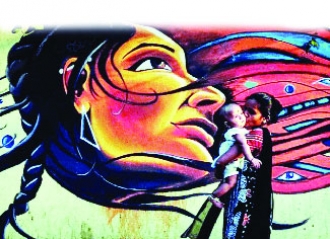
Introducing Nirbhaya Fund: Protect our Women!
by Kanika Kaul / 04 May 2018Gender-based violence cannot be eliminated by higher budgetary outlays. The policies are bound to have minimum impact if they are not backed up by inclusive public spending.
A little over five years ago, the Nirbhaya case shook the nation’s conscience and brought people to the streets in protest against the high incidence of violence against women in the country. The Government, under pressure, took swift measures to address the issue. It passed the Criminal Law (Amendment Act), 2013 (Nirbhaya Act) to bring amendments to laws on sexual offenses. Along with this, the Union Government introduced the Nirbhaya Fund to “protect the dignity and ensure the safety of women in India”.
The Kathua and Unnao cases have once again stirred public outrage, prompting the Cabinet to approve an Ordinance, awarding death penalty for those convicted of raping girls below the age of 12 years. While questions have been raised about the rationale of such a move, arguing against its futility, questions also arise about the intent of successive Governments to address fundamental gaps in the programmatic framework to address violence against women.
Given the sense of urgency witnessed at the time of the Nirbhaya case, it is worth reviewing how Government interventions for addressing violence against women fared in the last few years. Both, budgetary allocations and the utilisation for the concerned schemes throw concerns. Against the recommendations of the Working Group on Women’s Agency and Empowerment for the 12th Five Year Plan, allocations for the five-year period (2012-13 to 2016-17) to Swadhar Greh scheme (shelter homes for women in distress) and One Stop Centres scheme (OSC), which are meant to provide integrated support and assistance to women affected by violence, have been 65 per cent and 74 per cent respectively. Of the allocated funds, fund utilisation in both schemes was 62 per cent and 77 per cent respectively.
Other schemes, such as Ujjawala (for prevention of trafficking) and Mahila Police Volunteer initiative received small allocations of Rs 50 crore and seven crore rupee in 2018-19 respectively. Moreover, the Union Government’s scheme for ‘Assistance to States for implementation of Protection of Women from Domestic Violence Act, 2005? was withdrawn in 2015-16 after funds allocated for the scheme remained unutilised. The operationalisation of Nirbhaya fund too has been plagued by a dearth of appropriate proposals and low levels of fund utilisation.
How does this reflect on the implementation of interventions? The coverage of most interventions is distinctly low. For instance, against the Union Government’s initial proposal of establishing an OSC in each district, only 236 have been approved, of which, 170 OSCs are operational (as of February 2018). Likewise, with a total of 559 Swadhar Greh in the country (as of December 2017), the distribution of these across States is highly skewed. Provisions made under these schemes also fall short of meeting requirements. OSCs, for instance, have a maximum provision for accommodating five women at a time.
Media reports have regularly highlighted the deficiencies in services being provided at these centres. Likewise, a recent report by the National Commission for Women has brought to light how, among other factors, lack of sufficient funds is constraining the quality of services provided in Swadhar homes. Effective implementation of policies and legislations quite simply require adequate funds. Violence against women is unarguably a complex issue, a reflection of the imbalance in gender relations in society. Higher budgetary outlays by themselves will not be able to eliminate gender-based violence but are nonetheless critical to ensure an effective response mechanism to provide appropriate support to women in distress.
Moreover, budgetary allocations for schemes specifically meant to address violence against women, reveals important gaps, more fundamentally, investing in women’s education, health, paid employment and ensuring access to basic, quality services would help reduce their vulnerability to violence. The neglect of women’s interests in budgets, and of other disadvantaged sections of the population for that matter, is not a recent phenomenon. It is time we recognise that policies and legislations, though crucial, by themselves would only achieve limited impact unless backed by adequate public spending.
(The writer works with the Centre for Budget and Governance Accountability)
Writer: Kanika Kaul
Courtesy: The Pioneer
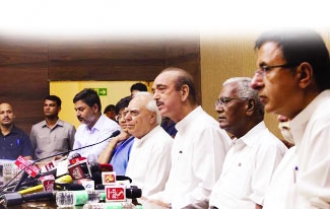
Opposition Parties Demanding Removal of the CJI, Deepak Mishra
by Amrita Bhinder / 26 April 2018Although thoughts and guesses cannot replace proofs. Nobody in the opposition parties has full proof evidence , still they are demanding the CJI’s removal on plain conjecture.
As someone who has held the Supreme Court (SC) of India to be a sacred space of our democracy right from the day when I roamed the corridors of the SC as a young bright-eyed lawyer, it is distressing to see seven opposition parties led by the Congress, move a notice for the removal of the Chief Justice of India (CJI) Dipak Misra.
Former Prime Minister and senior Congress leader Dr Manmohan Singh’s name was conspicuously missing from the list of the 64 parliamentarians who signed the notice for the removal (impeachment) of the CJI and the SC, in a reaction to the notice, said that statements by lawmakers on the impeachment of judges were ‘disturbing’. It is indeed a black day for India as this is the first time in the country’s history where a removal of the CJI has been asked for and that too, without substantial ground.
Be it, Congress’ big-heartedness as they claim that the party did not involve Manmohan Singh because of his stature as former Prime Minister of the country, or be it the former Prime Minister’s own decision not to put his name on the dotted line, it is also quite telling how wrong this move is.To read into the reasoning for the Congress and the Opposition’s demand to remove CJI, be it the recent Judge Loya verdict or the Ram Mandir hearings, will murky the waters further as well as scandalise the judiciary. Without getting into the motivations and keeping politics out of it, no history book will be kind to this foolhardy move against the judiciary.
The legislature, executive and judiciary are considered as three pillars of the democracy and to publicly attack a strong and respected institution such as the judiciary with such ease as well as abject lack of thought is shameful. The fine balance between the three is the backbone of India’s Constitution and those asking for the removal of the CJI, must keep in mind the decorum dictated by the Constitution for they seem to have lost the plot. The separation of power that ensures the independence of the judiciary has been very carefully penned in the Constitution by our founding fathers.They made the process of removing the CJI, a painstakingly arduous task, as they more than understood that judgements passed by the judiciary may not please all and thus, made sure that other branches of the Government do not deem themselves to be ‘judge and jury’ on the judiciary or ‘second-guess it’, if any judgment is inconvenient to them.
The signed movement such as this one, which does not stand on a substantial ground, mocks the judiciary and more dangerously, this brazen attack on it by lawmakers has set the worst kind of precedent for the world’s largest democracy. It needs to be understood that it’s not this easy under the Indian Constitution to do a coup d’état on the judiciary. Although enshrined within the Constitution, the process for the removal of the CJI or any other Supreme Court judge can be initiated in either House of the Parliament but it is so tedious that it has multiple levels of checks.
It requires a notice of motion issued by 100 MPs from the Lok Sabha, or 50 from the Rajya Sabha and the Speaker or the Chairman can accept or reject the notice. If and when the notice of the motion for impeachment is accepted, the Speaker or the Chairman is to form a three-member committee to investigate the charges. Upon finding merit in the allegations, if at all, the committee recommends the motion of impeachment be taken up by the Parliament and it would then be put to vote where the House must pass it by a special majority — not less than two-thirds. In other words, at least 364 members should have voted for the motion in the Lok Sabha, and 164 members in the Rajya Sabha. Once both Houses pass the motion, it would then be placed before the President for approval and if the President assents, then the CJI stands impeached.
A simple reality check of the Opposition’s clamour, the hollowness of the allegations that form the basis of the move and the sheer lack of numbers to see this through, make it more than apparent that such a (mis)adventure is doomed from the get go. Unlike a Samurai’s seppuku, there is no honour here and so, therefore, the question that comes to mind is — why such harakiri is being attempted and to what end? Simply put, the idea is not to seek a real impeachment but is a knee-jerk salacious attempt to publicly defame and malign the CJI and the judiciary and also appears to be a tool to intimidate and disrupt it. As with the judiciary, be it questioning the Election Commission on EVMs, the Army on the surgical strikes, the Prime Minister’s or President’s office, the Opposition has seized every opportunity to try to cast shame on strong and respected institutions that make India proud.
While most of the Opposition’s attempts have only ended shaming itself, the vile attempt will not completely break a strong pillar of our democracy but it has compromised the dignity of judiciary. In the past, too, the Congress has indulged in actions that were aimed to destabilise the judiciary. In 1973, Justice A N Ray was appointed as the CJI in a controversial manner that saw him supersede three senior Supreme Court judges. The move was seen as an unveiled and direct attack on the sovereignty of the judiciary and similarly, in 1986 when the Rajiv Gandhi-led Congress Government overturned the then Supreme Court’s landmark verdict in the Shah Bano case, it openly subverted the country’s apex court. This vile attack is a shameful and unveiled attempt to undermine it and the judgments it deliver. The media, which is considered to be the fourth estate, may not understand the magnanimity of this unprecedented Constitutional issue that needs to be dealt with refrain and caution. A great deal of responsibility rests with the lawmakers to not take away the credibility of judiciary and the media will also need to play a responsible role. As per the Constitution, citizens cannot sit on judgment over the judges.
Thus, allegations, counter-allegations, the merits or the lack thereof to make the case for the removal of the CJI or any other judge is not open to debate, least of all, on television channels. I cannot emphasise this enough as it appears that many are debating the competence of the incumbent CJI without reading the status assigned to him in the Constitution of India, wherein it has been made virtually impossible to cast aspersions for his removal without evidence even when the matter is debated under the privilege of the Parliament.
‘Suspicion’ cannot replace ‘evidence’, and right now nobody has the evidence but is crudely demanding CJI’s ouster on plain conjectures. Let it be known that while some quarters work to impair the judiciary, they also jeopardise India’s foreign policy and interests, be it, national security or commerce. Things such as the extradition of economic offenders, terrorists or any such variety would come under a shadow of doubt. Thanks to this motley bunch constantly on the job to undermine every other authority in India but their own self.
(The writer is a lawyer and the State Spokesperson for BJYM, Chandigarh. Views expressed are personal)
Writer: Amrita Bhinder
Courtesy: The Pioneer
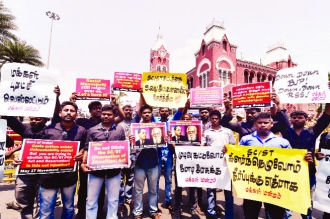
Supreme Court Judgement Against Enforcement of SC/ST Act
by A Surya Prakash / 24 April 2018The Government has recently filed an appeal against the Apex Court’s judgment on SC/ST act. Now, it’s the time for citizens to leave the path of violence and carry forward their complaints and let the judicial take necessary actions.
The nation observed Ambedkar Jayanti on April 14 around the time when there were disturbances in some parts of the country consequent to a judgement of the Supreme Court regarding the enforcement of the Scheduled Castes and Scheduled Tribes (Prevention of Atrocities) Act, 1989. Much of the protests have been triggered by opponents of the Bharatiya Janata Party (BJP) who have tried to lay the blame at this party’s door in a bid to generate hostility against it among the Dalits, even as the Narendra Modi Government has filed a review petition in the apex court.
The political twist given to the court’s judgement and the violence on the streets is truly unfortunate because it goes against the firm advice given by BR Ambedkar when the Constituent Assembly adopted the Constitution. Once the Constitution is adopted, he said, citizens must abandon the unconstitutional path to put forth their grievances.
In the judgement that has triggered the agitation, the court said that it had noted the working of the Act over the last three decades and it had been “judicially acknowledged” that there are instances of abuse of the Act by vested interests against political opponents in Panchayat, Municipal or other elections to settle private civil disputes arising out of property, monetary disputes, employment disputes and seniority disputes.
Innocent citizens are termed as accused, which is not intended by the legislature. The legislature never intended to use the Atrocities Act as an instrument to blackmail or to wreak personal vengeance.
The apex court said that the under privileged need to be protected against any atrocities to give effect to the Constitutional ideals and the Atrocities Act has been enacted with this objective. “At the same time, the said Act cannot be converted into a charter for exploitation or oppression by any unscrupulous person or by police for extraneous reasons against other citizens, as has been found on several occasions in decisions referred to above. Any harassment of an innocent citizen, irrespective of caste or religion, is against the guarantee of the Constitution. This court must enforce such a guarantee. Law should not result in caste hatred. The Preamble to the Constitution, which is the guiding star for interpretation, incorporates the values of liberty, equality and fraternity”. Also, the Act was “not intended to deter public servants from performing their bona fide duties”.
Following the court’s judgement on March 20, agitators took to the streets and a Bharat Bandh was organised against what they called the “dilution” of the Act. They said, the judgement would completely nullify the main purpose of the Act and actually protect the perpetrators of atrocities against the Dalits. While some questioned the theory that the Act was being misused, others said the premise on which the court had drawn its conclusions was incorrect. There were also the argument that this would completely jeopardise the efforts of the Indian state to protect the Scheduled Castes and Scheduled Tribes who have faced and continue to face oppression across the country.
The Narendra Modi Government promptly filed for a review of the judgement. It took the stand that offences under this Act were heinous crimes which were committed to humiliate and subjugate SCs and STs. It said that the Government was committed to ensuring the well-being of the Dalits and tribals and that it did not agree with the reasoning of the Supreme Court. Law Minister Ravi Shankar Prasad said it was important to note that the Union Government was not a party to the proceedings at all and, therefore, a very comprehensive review petition had been filed. The Government noted that less than 25 per cent of the cases filed under the Act resulted in conviction of accused persons. Therefore, the court’s judgement would only further impede justice for the victims of atrocities.
The Government felt that the accusations hurled at it by its opponents were baseless because it enjoyed the confidence of the Dalits. Electoral studies have shown that the BJP’s share of the Dalit vote jumped from 12 per cent in 2009 to 24 per cent in 2014. Also, the party bagged 66 of the 131 Lok Sabha seats reserved for Dalits and Tribals in the country. While doing so, it had completely wrecked the electoral base of the pro-Dalit Bahujan Samaj Party which did not win a single reserved seat. The Congress also saw erosion of its Dalit base.
Speaking in the Constituent Assembly on November 25, 1949, Ambedkar cautioned the citizens and told them what they had to do if they wished to maintain democracy “not merely in form, but also in fact”. He said, “The first thing in my judgement we must do is to hold fast to Constitutional methods of achieving our social and economic objectives. It means we must abandon the bloody methods of revolution. It means we must abandon the method of civil disobedience, non-cooperation and satyagraha. When there was no way left for Constitutional methods of achieving economic and social objectives, there was a great deal of justification for unconstitutional methods. But where Constitutional methods are open, there can be no justification for these unconstitutional methods. These methods are nothing but the grammar of anarchy, and the sooner they are abandoned, the better for us”.
Now that the Union Government has filed a strong review petition on their behalf, the Dalits and the tribal communities, which are anguished over the court order, must allow the judicial process to take its course. Any group or community that feels aggrieved about something must remember Ambedkar’s sage counsel. Because, as he has warned, violent methods of protest could imperil democracy.
(The writer is Chairman, Prasar Bharati)
Writer: A Surya Prakash
Courtesy: The Pioneer
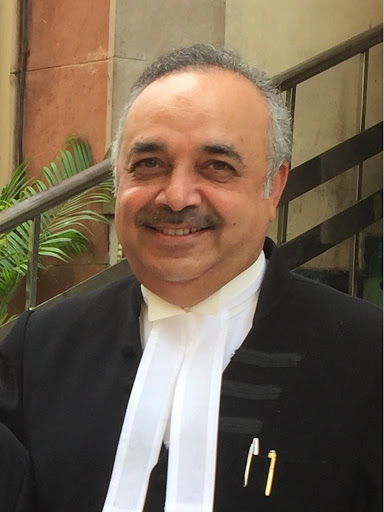
MCI related mess cleared by court
by Dr Rahul Misra / 23 April 2018In a landmark judgment, the Delhi High Court, has ruled that the Central Government can direct Medical Council of India (MCI) in respect of, inter alia, matters pertaining to enhancement of MBBS seats in medical colleges.
Under Section 10A of the Medical Council of India Act 1956, the powers/functions of MCI and the Central Government have been defined but, in some cases, the MCI and the Central Government have been taking different/opposing stands and because of which, there had been spurt of litigation in various courts in India.
In the case of Chettinad Hospital and Research Institute vs. Union of India & Ors., in Delhi High Court, Justice Rekha Palli has ruled, that since, the Central Government is the final authority for granting pemissions, etc. under the MCI Act 1956, therefore, it has got the power to give directions to the MCI. Not only this, the court has held the conduct of the MCI as an example of “red tapism”, “callous”, etc.
Chettinad Hospital and Research Institute had applied for increase of MBBS seats from 150 to 250 seats. MCI, without affording opportunity required under the MCI Act recommended rejection of the scheme of the institute, however, after examining the application the Central Government disagreed with MCI and directed MCI to process the application. In spite of the Central Government’s directive, MCI again recommended the rejection of the application; therefore, the institute approached the Delhi High Court.
Mr. Arun Bhardwaj, Senior Advocate, appearing for the institute raised several important legal arguments, including the powers of the Central Government vis a vis the powers of MCI under provisions of the MCI Act 1956. It was contended that there is requirement of medical seats in India and the conduct of MCI is contrary to the law settled by the Supreme Court.
In view of the importance of the matter, the Delhi High Court called upon the Additional Solicitor General to appear. Ms. Maninder Acharya ASG, appeared on behalf of the Central Government and stated that the Central Government has got powers under Section 10A to give directions to the MCI and the conduct of MCI is a glaring example of “red tapism”.
For the MCI, Mr. Vikas Singh, Senior Advocate appeared and opposed the submissions of Mr. Arun Bhardwaj and Ms. Maninder Acharya ASG. While delivering the landmark judgment, the Delhi High Court has settled the law that since the Central Government is the final authority, therefore, under Section 10A of MCI Act, the Central Government can give directions to MCI. This judgment has far reaching consequences and is expected that the delays in respect of setting up of medical colleges, courses, increasing the number of seats, etc. would come to an end.
Writer: Dr Rahul Misra, Associate Editor Opinion Express Group

Tech: Diminishing Human Interference; Major Reason For “Dumb” Mind
by Navneet Anand / 18 April 2018In today’s world, technology holds a lot of importance and, therefore, a number of people misuse technology without knowing its consequences. Increase in misusing technology leads to reduction in our minds capabilities. It also affects the human interference, reducing it at a rapid scale, from our lives, raising a number of questions that needs to be addressed.
The drive from Gururgram to Delhi, especially in the evenings, can be enormously painful and a grim reminder of how poorly we manage our traffic. I had a similar experience recently when despite our best attempts, we got stuck in the endless snarls and kept crawling for over two hours. What made the experience worse was the pin drop silence inside the car, all this while. Even as the driver negotiated the harsh traffic and relentless honking, the other two young occupants remained engrossed with their smartphones. One watched an Amazon video, while the other enjoyed MP3 music. Technology has pervaded human interface.
My ordeal continued as I reached a dinner party after the gruelling drive and was confronted with a rather unique ‘human-like object’ which had almost all the 30 odd guests, children and elderly alike, in awe of it. They all scrambled for the attention of Alexa, the virtual assistant from Amazon, almost endlessly during the three-hour get together and this naturally meant all of them compromising a great deal with the good old human connect. Welcome to the new age of rapidly diminishing human interface.
We live in exciting times and perturbing too! Suddenly we find human minds getting increasingly subservient to artificial concoctions. Ask a child a time during the day, or which date was last Wednesday and her first instinct would be to reach out to a handset nearby. Ask a youngster about the first President of India, or in which year the Emergency was declared or what had happened on 9/11 and where and her first instinct would be to Google it, even though she may knows it. This tendency to allow technology to intervene and mediate, and in the process reduce our minds natural capacities, is also becoming prevalent among not so young as well. Ask a 35-year-old professional if he had time for a meeting the next day at 1 pm, and his first reaction would be to reach out to his handset to check his calendar.
Look at this screaming headline in the UK’s leading daily The Telegraph and one begins to wonder what have we done to ourselves: The human brain can store 4.7 billion books — 10 times more than originally thought. The article elaborated, “The human brain has a capacity of one petabyte…One petabyte is the same as 20 million four-drawer filing cabinets filled with text, 13.3 years of HD-TV recordings, 4.7 billion books or 670 million web pages.” The pattern of behaviour of modern men and women stands in stark contrast to this fact. The over-dependence on technology and our temptations of allowing gadgets to mediate our existence are beginning to threaten not only the capacities of human brains but also the social and cultural milieu in which we live.
Little wonder, suddenly the debate over data privacy and the way these new age superpowers in Facebook and Google are invading individuals’ private space is turning curious, and compellingly relevant. What could be the possible reasons for these apparent vulnerabilities of human existence? One certain reason could be the terrible technology tilt. It is indeed true that technology has made things far easier than we could imagine. So, my young colleague can watch many episodes of Stranger Things on Netflix without any anxiety of reaching home and make herself cozy in front of the television set. She can communicate seamlessly with family and friends on WhatsApp groups, or share pictures of her Manali trips with them in a few clicks. She can put alarms on her phone, listen to her favourite music or tell Google to remind her of a meeting next Wednesday. But in the process, she may have, and possibly inadvertently, allowed her brains and natural reflexes to take a back seat. Her human interface is getting minimal, and this has implications, not too difficult to comprehend.
Another reason for this growing vulnerability could be called the handheld model of child socialisation — where grandma’s folklores are replaced by jingle bells, antics of siblings by Tom & Jerry cartoons, and sweat on the ground by stress on the screens. The handheld phones have scrupulously displaced cradle model of socialisation and the results are far too glaring to be ignored. Children are hooked on the phones likes honeybees with hives! Human mediation in the lives of modern children are hugely limited and that could potentially be making them far less social than their predecessors. This has definite social implications, including a society far less cohesive than it used to be.
The rapidly diminishing human interface from our lives is staring at us with many questions that we must take up earnestly.
(The writer is a strategic communications professional)
Writer: Navneet Anand
Courtesy: The Pioneer

Domestic over International: Latest Rule Regarding Seeding Companies
by Sandhya Jain / 17 April 2018Recent ruling from the Delhi’s High court forbids Monsanto from stopping supplies. As a result, this will slow down the ability of a number of multinationals to establish a seed monopoly and an increase in domestic seed companies is evident.
Opponents of genetically modified crops received a boost when the Delhi High Court upheld the Indian Patent Act, which states that seeds and life forms cannot be patented, and the Protection of Plant Varieties and Farmers’ Rights Act, 2001 (PPV&FR Act), which biotechnology multinationals have tried to undermine, and ruled that key plant genetic material cannot be patented. The court was deciding a dispute between Monsanto and Nuziveedu Seeds Ltd, Prabhat Agri Biotech Ltd and Pravardhan Seeds Private Ltd, over interpretation of law, especially Section 3(j) of the Indian Patent Act and applicability of PPV&FR Act for transgenic plants.
Justice S Ravindra Bhat and Justice Yogesh Khanna, on April 11, ruled that Monsanto Technologies LLC does not have the patent for Bt Cotton seed varieties ‘Bollgard’ and ‘Bollgard II’. The Bench permitted Monsanto three months to register the seed varieties under the Plant Varieties Act (PV Act), which would entitle the firm to trait fee (royalty) as fixed by the Government, give it control over plant reproductive materials, but not the key genetic material, which would be available to the public for further research and development.
The ruling is a boost to domestic seed companies that used Monsanto’s gene to prepare Bt Cotton seeds for farmers, and will seriously curb the ability of multinationals to establish a seed monopoly in India, which is the goal of the GM industry. This could downsize the market for genetically modified seeds in India (in any life form) and pave the way for more environmentally sustainable agriculture.
Bt Cotton was pushed into India by the backdoor, which emboldened the MNCs to try to create monopolies in GM food crops, viz, Bt Brinjal (scuttled by then Environment Minister Jairam Ramesh) and GM Mustard. Illegal trials of many GM food crops have been exposed in many places. Swadeshi Jagran Manch co-convener Ashwani Mahajan and Bharatiya Krishak Samaj president Krishan Bir Chaudhary said the ruling vindicates efforts to protect farmers’ rights and India’s food security. The Competition Commission of India has been urged to take note of the judgement, complete its investigations into the company and ensure full refund of Rs 7,000 crore extracted as excess royalty from eight million farmers since 2002.
The judgement is especially rewarding in view of covert attempts by officials of the Union Ministry of Agriculture to help the company during hearings last year. Additional Solicitor General Tushar Mehta realised that while the Government of India stands aloof from the dispute between two private parties, the court should be apprised of the views of the Union Government, in writing, as its judgement could impact multiple litigations regarding seed patents and transgenic traits, in which the Centre is involved. A ruling delivered without knowledge of the Centre’s views could adversely affect the Indian farmer and consumer.
Mehta asked senior Ministry officials to file the Written Submission, Affidavit, and Application prepared by his office, as only the Ministry could intervene in the matter. The crux of his concern was that the law laid down in this case [FAO(OS)(COMM) No. 86 of 2017] could be extended to other crops like rice, wheat, soyabean, groundnut among others and even animals like chicken, pig, sheep, goat, wherever a transgenic trait is introduced. However, in a shocking act of subversion, the concerned officials failed (or refused) to file the written submissions in time; it took a special effort to place the Centre’s views on record.
Briefly, Monsanto’s patent from the Indian Patent Office (No. 214436) included the ‘nucleic acid sequence’ and process to insert the same in plant cells, and covered 27 claims. Monsanto claimed its invention comprised of identification of desired gene (Cry2Ab) from the DNA of Bacillus Thuringiensis (BT) bacteria, which is found naturally in soil; making (synthesizing) nucleic acid sequence by copying the Cry2Ab for insertion into a plant cell; and the method of inserting the said nucleic acid sequence into a plant cell.
Monsanto claimed its patent is a biotech invention containing infusion of Bt gene into the cotton genome, and eradicating pests afflicting the cotton plant. It sold 50 Bt Cotton ‘Donor’ seeds to Nuziveedu and its subsidiaries under licensing agreements in 2004 and 2015, which the companies used in their breeding programme to inherit the Bt cotton trait to their proprietary cotton plant varieties. Monsanto never licensed any ‘technology’.
Nuziveedu countered that Bt Cotton plant varieties developed by its group have distinct characteristics apart from the Bt Trait and Donor Seeds variety sold by Monsanto. They applied for Intellectual Property (IP) protection for all their varieties. Cotton was brought under the Essential Commodities Act, 1955, in December 2015, to help fix the sale price of cotton seeds to farmers at affordable prices uniformly across India. The Centre estimates that during 2010-15, domestic seed companies paid Monsanto’s subsidiary roughly Rs 1,600 crore in excess of actual trait value fixed by various State Governments.
The All India Kisan Sabha; Dept of Agriculture and Cooperation; State of Telangana; National Seed Association of India and some seed companies filed cases against Monsanto group before the Competition Commission of India. The CCI in April 2016 asked Monsanto not to enforce post-termination clauses on Nuziveedu group, which said it was not obliged to pay more than the “trait value” fixed by State Governments, adding that Monsanto’s patent concerns an un-patentable matter by reason of Section 3 (j), and is liable to be cancelled.
Nuziveedu argued that the Bt Trait cannot be sold directly to farmers, but has to be transferred into superior cotton hybrids through traditional plant breeding methods so that the seeds have the agronomic traits required for production of cotton. Moreover, “plants” are excluded from patentability by Article 27(3)(b) of the Trade-Related Aspects of Intellectual Property Rights (TRIPS) Agreement.
Registration of a plant or transgenic variety under Section 28 of the PV Act confers certain exclusive rights to the breeder; Section 30 allows researchers to use any registered variety for developing new varieties; while Section 39 gives farmers the right to save, sow, re-sow, exchange, share and sell farm-saved seeds of any protected variety, including transgenic variety.
The ruling forbids Monsanto from stopping supplies to seed companies and holding farmers hostage. Monsanto will have to abide by Indian laws to operate in India. Reluctance will help revive the native seed industry which has been undermined by the agri-MNCs and their links with public-funded agricultural institutions that never bothered to assess the impact of GM seeds on soil, animal and human health.
(The writer is Senior Fellow, Nehru Memorial Museum and Library; the views expressed are personal)
Writer: Sandhya Jain
Courtesy: The Pioneer
FREE Download
OPINION EXPRESS MAGAZINE
Offer of the Month





